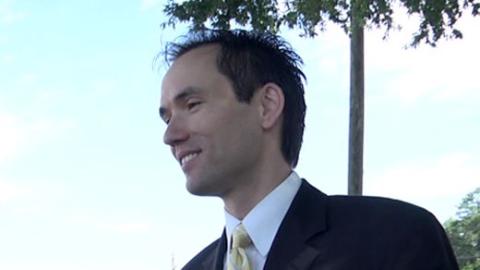In an election that might foretell trends in 2014, the Virginia gubernatorial race may have a spoiler.
In recent polling, Libertarian Party candidate Robert Sarvis has accumulated approximately seven percent of the vote in the race between Democrat Terry McAuliffe and Republican Ken Cuccinelli.
Quinnipiacshows McAuliffe leading Cuccinelli 44-41 with 7 percent for Sarvis.
A poll from Harper, which leans Republican, has McAuliffe ahead 42-37 with 10 percent for Sarvis. However, Harper also shows that Sarvis' support is not relegated to dissident Republicans with 4 percent of his support coming from Democrats and 18 percent from independent or third party voters.
Another poll from Roanoke College shows McAuliffe with a two point lead and Sarvis receiving eight percent. Although he has not been invited to debates or included in other polls, Sarvis is a presence in the race.
Sarvis, who has never before held office, is a former Republican and Virginia's first Libertarian candidate for governor since 2001. Realizing his bid will be a challenge, Sarvis says he is talking about issues neither of his opponents are discussing:
"'I'm talking about issues that just aren't being talked about,' Sarvis said in an interview with Watchdog.org, mentioning pension reform, decriminalizing minor drug offenses, creating a preferential-free and simple tax system and shrinking Virginia's reliance on the federal government."
Cuccinelli has taken some broadly libertarian positions on voting rights and civil liberties. He's also managed to alienate some libertarian and independent voters by his positions on abortion and same-sex marriage, so Sarvis may have a dissatisfied base from which to draw support.
The big question will be whether Sarvis can maintain his current level of support or even improve upon it. Larry Sabato, head of the Center for Politics at the University of Virginia, believes it will be difficult for the Libertarian candidate:
"Sarvis doesn't have money to sustain support on his own. He has raised a pittance compared to the other two, and he'll be drowned out in the final weeks of the campaign unless he gets lots of free news coverage."
Virginia's gubernatorial election is always held during the off-year between the presidential election and midterms. So, Virginia is sometimes a bellwether of the country's political momentum.
In 1993, Republican George Allen won Virginia's governorship ahead of the GOP's historic 1994 congressional victory and Jim Gilmore won ahead of the Republicans' hold of the House in 1998. Likewise, Democrat Tim Kaine won in 2005 ahead of the Democratic sweeps of 2006 and current governor Bob McDonnell won in 2009 ahead of Republican congressional victories in 2010.One of the constant messages with these polls is that Virginia voters are unhappy or uncommitted to either McAuliffe or Cuccinelli. This, more than anything else, might be the source of Sarvis' numbers.
More than six weeks remain before Virginians go to the polls to elect their next governor and, incidentally, give the first indications of what 2014 may portend.
Libertarian Robert Sarvis is not likely to win on November 5, but if present trends continue, his share of the vote might indicate that the status quo is unacceptable.
